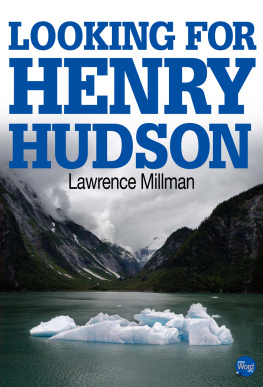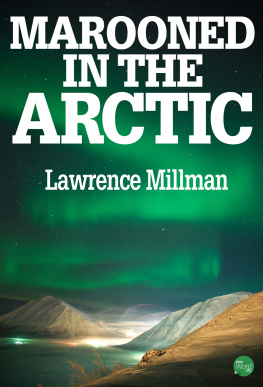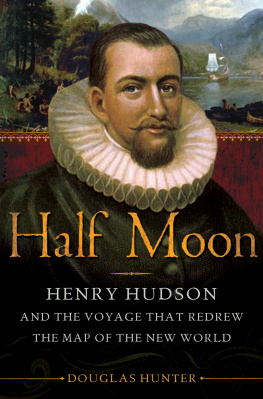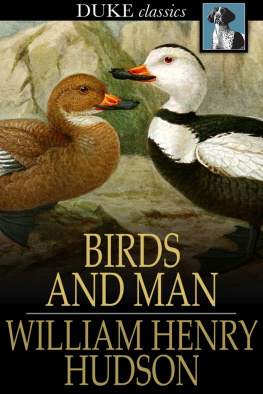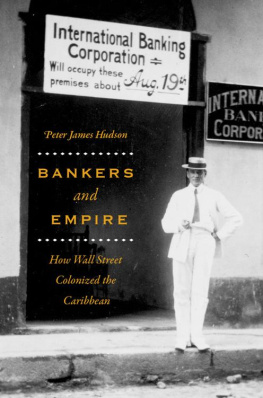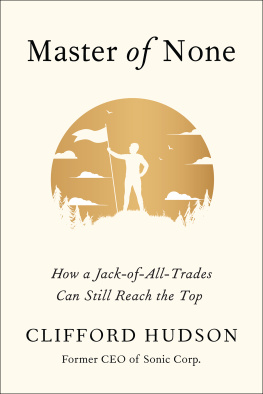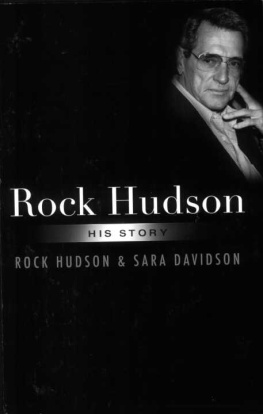It could be a scene from a movie a sort of Mutiny on the Bounty. Nine figures huddle together in an open boat. One of them, the captain, has a look of numb surprise on his face. His teenage son reaches for his hand, perhaps to comfort him, perhaps just seeking some degree of warmth. One man is shaking his fist at unseen enemies; another is sobbing. The rest of the castaways, scurvy-sick, seem indifferent to their fate.
The camera backs off to reveal an old-fashioned bark with sails unfurled. The gap between the two vessels slowly widens until the smaller one is no more than a pinprick in the immensity of ice-flecked seas. Fadeout to, appropriately, white.
Our marooned captain now vanishes from history, at least official history. What became of him remains a mystery to this day, 400 years later. Yet Henry Hudsons life before he went missing is something of a mystery, too. We mention his name every time we refer to a great bay, a town, a strait, and one of the worlds most productive estuaries, but we know less about him than we do about his contemporary, William Shakespeare. Theres not even a surviving portrait of the man who was probably Englands most important maritime explorer before Captain Cook.
And yet Hudson bequeathed us a portrait of himself in the events of his four voyages. They suggest a man who was obsessed, self-absorbed, secretive, democratic, distrustful, intellectually curious, and paranoid. Likewise a captain who was a brilliant navigator, but whose very presence seems to inspire mutiny in his crews. In spite of his flaws or maybe because of them, Hudson emerged from these voyages as a remarkably human figure.
We first encounter him in 1607 as the captain of a rotten bark, the Hopewell, en route to the legendary riches of the Orient by way of the North Pole. (The Poles five months of sunlight blessed it with a warm climate, according to contemporary wisdom.) Scouring the Arctic from Greenland to Spitzbergen, he reached 81N, the farthest north anyone would sail for more than 200 years. His progress was finally frustrated by sea-ice not exactly a warm climate phenomenon.
The following year Hudson sailed under the same sponsors, the English Muscovy Company, and this time tried to reach the Orient via the Arctic coast of Russia; ice stopped him, so he turned his ship around and started looking for a western passage. Whereupon his crew staged what might be sold a soft mutiny: Perhaps homesick, perhaps simply sick of the intemperate North, they refused to sail farther. Their compliant captain turned his ship around again and headed back to England.
In 1609, we find him attempting the same northeastern route in the employ of the Dutch. Heavy ice near Novaya Zembla again brought out his crews mutinous instinct. Another captain might have stuck to his guns, but Hudson gave in again. He preferred compromise to battle, a fact that seemed to make him an easy touch for the hard-bitten sea-dogs of his day.
So now they set course on a more southerly route, much to the delight of his fair weather crew. He sailed his ship the Half Moon across the Atlantic, along the eastern seaboard of America, and into New York harbor. After anchoring somewhere off West 52nd Street, he began navigating the river that would later bear his name. Along the way he met a number of Delaware and Mohican Indians, and at one point threw a party for several of their chiefs; his guests got so drunk that their descendants were still talking about it 200 years later.
He would travel as far as the present site of Albany before concluding that upstate New York was not the gateway to China. But his voyage was not a failure, at least not for his employers, who now claimed the Hudson River Valley as Dutch property.
Back home Hudson was criticized for selling his services to a rival power, although not for long. He was Englands most experienced Arctic hand at a time when England was looking for the shortest route to the putative riches of the East; and the shortest route, for such a relatively high latitude country, was across the Arctic... west across the Arctic, Hudson himself believed. So a syndicate of wealthy English merchants headed by Sir Dudley Digges and Lord Wolstenholme now gave him command of the most lavishly funded, single-ship expedition of its day, telling him, in effect, Go find the Northwest Passage.
On April 17, 1610, Hudson sailed the fifty-five-ton, bluff-bowed bark Discovery out of St. Katharines Pool on his fourth voyage of exploration. This one would make the previous voyages seem like Sunday school picnics.
Twenty miles down the Thames, he touched at Gravesend and picked up a young protg of his named Henry Greene. Greene was a wastrel, a libertine, and all-around rogue a peculiar addition to the crew. Robert Juet, the mate, believed Greene had been shipped aboard to spy on the others. This may have been true: A good spy can nip mutiny in the bud.
The Discoverys twenty-three-man crew was certainly no worse than the usual ragtag-and-bobtail crews of the day. It included the sharp-tongued but seemingly reliable Juet; carpenter Philip Staffe, steadfast as his name; Abacuk Prickett, a London haberdasher and Sir Dudley Digges valet; a rough but honest salt named John King; an able seaman named Robert Bylot; a young scholar, Thomas Wydowse, whod signed on as a passenger; and Hudsons son John, one of the ships boys.
A motley group, yes; but hardly a devils brew.
Hudson sailed up the east coast of Britain to Iceland, then steered a course past Greenland to the tidal overfall at the entry to Hudson Strait. The strength of this tide-rip, first noted a generation earlier by Captain Davis, suggested a possible passage between the Atlantic and Pacific Oceans.
Pacific, indeed! Armadas of racing ice now buffeted the Discovery like a cockleshell, forcing Hudson to alter his course repeatedly. At last he took his ship south to Ungava Bay, where it got stuck in a crazy quilt of ice. The crew began to grumble. Anyone who has ever been stuck in sea-ice can sympathize with them; you feel like you might be stuck there for all eternity.
Hudsons crew couldnt go anywhere, so they really couldnt act on their grumbling. And little by little they worked the Discovery into open water. Hudson now set his course to the northwest. On August 3, he groped his way between two scoured, massive headlands (he named them, not surprisingly, Cape Digges and Cape Wolstenholme), and entered the vast saltwater reservoir of Hudson Bay.
Abacuk Prickett, who wrote the only surviving account of the trip, was not impressed with the local scenery. A most barren place, having nothing on it but plashes of water and riven rocks, as if it were subject to earthquakes, he remarked.
But Hudson himself was pleased, at least initially. Having just passed through a strait longer than the Strait of Magellan he felt that he had won the Passage. But as the ship moved southward along the derelict shoreline of Hudson Bay, he may have felt that hed won only a booby prize.
By September, hed entered the bays bottom pocket, the mariners bugaboo now known as James Bay (the Hudson Bay Company would later average a shipwreck a year there). James Bay is swampy, shoaly, and wind-whipped. Its so shallow that you can be out of sight of land and still touch bottom with a paddle. Wading ashore can be like wading through quicksand.
Hudsons already frayed nerves seemed to snap, and he took out his frustration on the crew. So when Juet mocked his belief that they would be in Java by Candlemas (February 2), he flew into a rage and condemned Juets abuses and slanders as mutinous behavior. The mate was stripped of his rank and replaced by Robert Bylot, the former pilot. Boatswain Francis Clements was deposed on similar charges and replaced with a ruffian named William Wilson.
Next page
